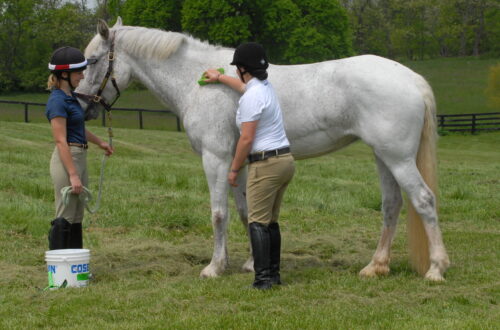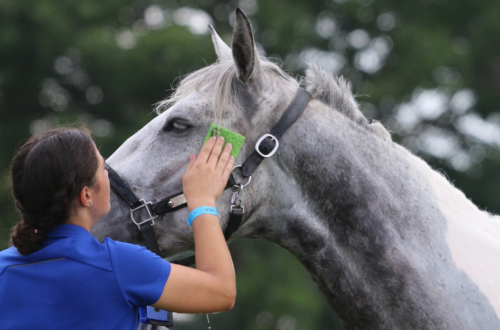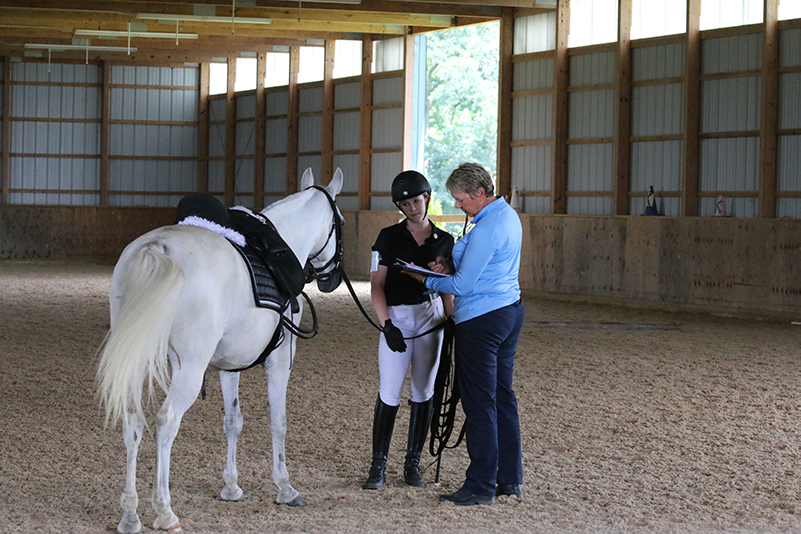
Becoming a United States Pony Clubs National Examiner
By Sarah Morgan, National Examiner and Co-Chair of the USPC Examiners Committee
You may already know that if you take a national certification with the United States Pony Clubs, you will be tested by a National Examiner (NE). National Examiners are well informed and active in the horse industry, have in-depth knowledge of the USPC Standards of Proficiency and USPC programs, and also have strong connections to Pony Club.
Why Become a National Examiner?
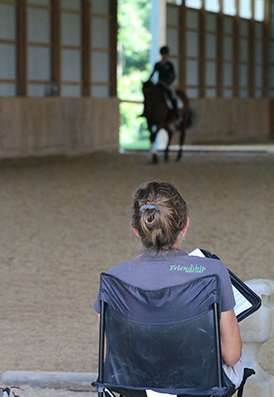
Some National Examiners say they became NEs so that they can help ensure the excellence of the Pony Club curriculum. Others appreciate the “checks and balances” that National Testing guarantees at the highest levels of the organization. Still others want to make sure that certifications earned in USPC regions, from north to south, east to west, including Alaska and Hawaii, are recognized as equal, no matter where a member lives, rides, competes, or works. But the main reason for being a National Examiner is a desire to help others succeed. Many examiners are lifelong USPC members who were themselves “on the other side of the clipboard” as candidates; they can empathize with the rigors of preparing for and undertaking the process of attaining national-level certifications.
Who Becomes a National Examiner?
Examiners are active participants in the equine industry. They are experienced horse people: trainers, competitors, veterinarians, professors, professionals in a variety of horse- and non-horse-related disciplines. National Examiners are a diverse group of USPC members and volunteers who believe deeply in the benefits of Pony Club participation. Their role is crucial to the success of the USPC curriculum; National Examiners travel to every region in the U.S. to help candidates attain their goals while maintaining standards that ensure consistency throughout the country.
National Examiner Requirements
National Examiners are held to rigorous standards of knowledge and ability. To keep an Examiner’s knowledge as updated and relevant as possible, there are yearly requirements for continuing education, volunteering on USPC committees and at local-level testings, as well as training in the latest safety practices for riders and horses. A yearly virtual seminar gives examiners the opportunity to explore concepts in riding and horse care and provides updates on the USPC Standards of Proficiency, testing procedures, and discipline-specific rules changes.
Becoming an Apprentice
The National Examiner Apprentice Program provides a process for interested people, who must be at least 26 years old at the time of application into the program, and who have been testing at the club/center levels from D-1 through C-2 to develop the skills necessary for evaluating candidates going for their C-3 through A riding certifications and the H-B/H-A Horse Management levels. Apprentices must have been examining at the C-2 certification level for a minimum of three years before applying to become an apprentice. They must also have two references, with one being connected to the United States
Pony Clubs in some way.
What to Know
Ideal apprentices are knowledgeable in multiple disciplines (e.g., Eventing and Show Jumping), as Examiner panels may be assigned to testings that include two or more tracks. Examiners, and apprentices need to be good listeners and communicators, with expertise in time management and tact. NEs will interact with a variety of ages since candidates as young as 13 take the H-B and C-3 certification tests, and there is no upper age limit for participation in USPC testing. An NE must have theability to ascertain a candidate’s depth of knowledge on a subject, which is a key element in evaluating whether they have met Standards in that area. They must also be able to adapt to various learning and communication styles and be flexible on the job. And they need a lot of stamina to make it through long days while maintaining their objectivity and sense of humor.
Beginning the Process
Information on becoming a National Examiner is on the USPC website or may be obtained by contacting the National Testing Coordinator. The process begins with the potential NE submitting a multi-page application to the National Office along with videos showing the applicant riding or training in the discipline they want to test. Some of the questions asked of potential applicants include:
- Please explain why you want to be an NE. What qualities do you possess that make you a strong applicant, and why would you be an asset to the National Testing Program?
- Have you been an Examiner for club-level certifications? (If yes, please share the years you’ve been testing, number of tests you’ve examined, and the levels and disciplines involved.)
- Are you currently riding or competing? (If yes, please give a brief description of your current riding discipline(s) and/or competition level and how often you are riding.)
- Please list any degrees or other credentials you currently hold as an equine professional [e.g., DVM; vet tech; an Equine Management Science degree; British Horse Society credentials; a judge’s card (specify the level); or certifications from the United States Eventing Association’s Eventing Coaches Program, the United States Dressage Association, or the United States Hunter Jumper Association (specify the level)].
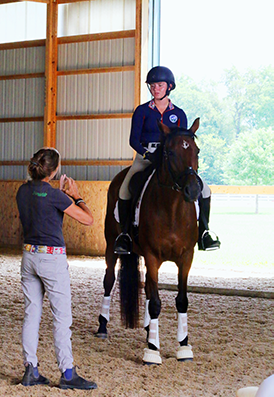
After discussing the merits of the applicant, the committee votes on whether to advance the potential apprentice to an interview with the Co-Chairs and at least one other member of the committee. After the application and interview process, successful applicants proceed as an apprentice National Examiner. They can then proceed with satisfying the requirements for becoming a National Examiner. These include attending certifications in whatever disciplines the apprentice wants to test and participating in the evaluation of candidates.
Other requirements include being certified in first aid, being a USPC Corporate member, and having a favorablebackground check completed. Apprentices must observe at least one testing at the C-3 and B levels, and if possible, one at the A level, as well as discipline certifications within their areas of interest. If they are wanting to be an NE for Horse Management, they will focus on attending H-A and H-B certifications. Additional educational opportunities, such as an NE seminar and online training modules, are also required to reach full NE status.
Although costs associated with attending certifications are the responsibility of the apprentice, many regions strive to make those costs as low as possible by providing lodging and meals. As long as the apprentice is not teaching or there is not a conflict of interest with any of the testing candidates, it is possible for them to attend tests in their area, which helps keep travel expenses at a minimum.
Apprentices should make every effort to be as prepared as possible for each test they attend. Knowledge of the Standards of Proficiency, as well as in-depth exploration of material covered by that particular test, is extremely helpful. Bringing their own SOPs and test sheets for the various certifications is a great way to practice writing comments independently. This then allows the testing panel to make suggestions for improvement.
At the end of each of the testings they attend, the apprentice, as well as the NEs they worked with, fill out evaluation forms. These evaluations are reviewed, and the apprentice is made aware of any inconsistencies or deficits in their participation at that testing. The apprentice’s mentor,as well as the Examiners Committee, are actively involved in evaluation of and discussions with apprentices to enable them to progress to full NE status within the two-year period they are given to complete the process.
Full National Examiner Status
After the apprentice is accepted as a full National Examiner, they are assigned to participate in certifications as a second or third Examiner. This enables them to become familiar with testing procedures and get tips from their fellow Examiners. Collaborating with the Examiner team is an important part of determining whether candidates are at or above the level of proficiency established by the relevant Standard.
If an NE wants to test at a higher level than they’ve been approved for, they must be riding, training, teaching/coaching, competing, or have officiated at that level of certification. And then the apprentice process begins again, although it’s not as involved as becoming an NE initially.
Although becoming a National Examiner is a rigorous process, it’s a rewarding one. The Examiners Committee welcomes applications at any time. Experienced Examiners—at all levels—are the backbone of the Pony Club curriculum.
For more information, please visit this page or contact the National Testing Coordinator or one of the Examiner Committee Co-Chairs, with questions. The Co-Chair contact information is available here.
This article on Becoming a National Examiner was originally published in the 2024 Spring issue of Discover USPC magazine. Read more content from that issue.




